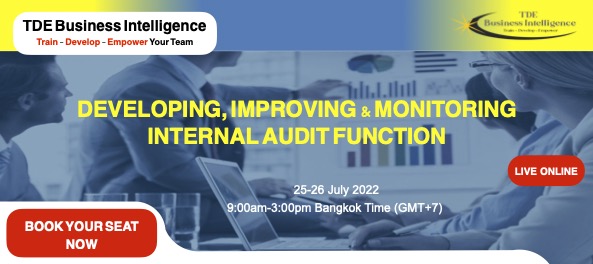
BENEFITS OF ATTEND
On completion of this programme, participants will have had the opportunity to re-examine their perceptions of what is best practice internal auditing. Key takeaways will give participants the confidence to engineer significant improvements in internal audit practice, and to benchmark internal audit functions (as well as individual internal auditors) against leading edge approaches. At an individual level, internal auditors will have been given the opportunity to evaluate their own internal audit performance.
WHO SHOULD ATTEND?
This newly designed course is made for those who need to understand what constitutes an internal audit function that contributes effectively to adding value, including:
- Those with oversight of internal audit, including board and audit committee members and senior management
- Heads of internal audit
- Providers of outsourced internal audit services
- Members of internal audit functions dedicated to improving their own effectiveness
- External auditors of entities with internal audit functions
- Standards setters
- Regulators in sectors where internal audit is important
The broad perspective of the course makes it ideal for participants from all sectors – including for- profit, not-for-profit, private, public and charitable.
METHODOLOGY
The course is designed to be participative in a non-threatening, optional way. Each session comprises a presentation by the course leader with an opportunity for participants to raise questions for group discussion and for comment by the course leader. The course leader will raise important issues for participants to consider before respond to at their discretion. The course is delivered virtually, using Zoom as the meeting platform.
COURSE MODULES
Day 1
Session 1: The future
- Tomorrow’s world
- Tomorrow’s company
- Tomorrow’s employee
- Tomorrow’s governance, risk management and internal control
- Tomorrow’s assurance
- Tomorrow’s internal audit
Session 2: Establishing internal audit’s purpose
- Nature of work
- Governance
- Risk management
- Control
- Scope of work
- Assurance and consulting
- Finance, accounting, and operations?
- Management levels subject to internal audit
- Auditing outsourced activities
- Determination of the scale of internal audit resources
- The internal audit Charter
Session 3: Internal audit independence, objectivity and authority
- Organisational independence
- Freedom from interference
- Individual objectivity
- Relationships with external audit
- Distinctive roles
- Co-ordination between the two audits
Session 4: Organisation of internal audit, and internal audit oversight
- Internal audit organisation in corporate groups
- Role of top management
- Role of the board and the audit committee
- Role of external audit
Day 2
Session 5: Resourcing internal audit, and developing internal auditors
- In-house, outsourced and/or co-sourced
- Recruitment and retention of internal auditors
- Supervising internal auditors
- Allocating resources for internal auditor training and development
- Proficiency and due professional care
Session 6: Internal audit departmental planning and control
- Risk analysis in internal audit planning
- Identifying and agreeing the audit universe
- Planning consulting engagements
- Monitoring progress against plan
Session 7: Conducting audit engagements
- Planning the audit engagement having regard to risk
- Openness or surprise audits?
- Communicating with auditee management and staff
- The place of audit testing
- Drawing reliable audit conclusions
- Discussing draft audit results
- Incorporating management’s responses
Session 8: Quality assurance and improvement programmes for internal audit
- Internal assessments
- External assessments
- Course recap
